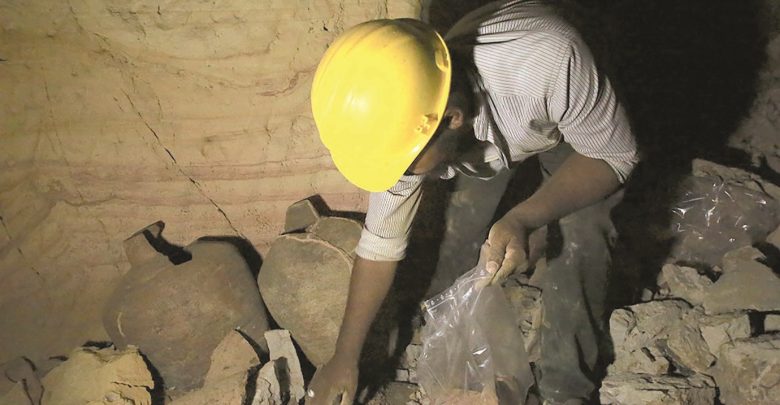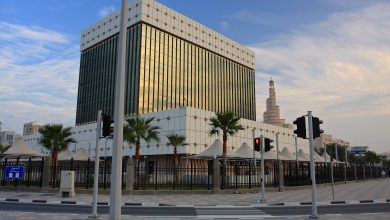
Qatar Museums are honored by two prestigious institutions in London and Paris
تكريم متاحف قطر من قبل مؤسستين مرموقتين في لندن وباريس
Twin honour for Qatar Museums
Two prestigious institutions have honoured Qatar Museums (QM) within a period of six months for the “unprecedented support” it offers to the Qatar-Sudan Archaeological Project (QSAP), it has been announced.
In a statement yesterday, QM said it was honoured by the International Society for Nubian Studies, which met last September at the Louvre, Paris, and by the Sudan Archaeological Research Society at its annual meeting at the British Museum in London last month.
The aim of the Qatar-Sudan Archaeological Project is to investigate, preserve and promote Sudan’s remarkable heritage and history, the statement notes.
The project represents a “bold and transformative approach” to heritage resource management for Sudanese Nubia designed to consolidate and preserve ancient sites by supporting archaeological surveys of unexplored landscapes and the excavation and conservation of these sites.
Founded in 1972 in Warsaw, Poland, the International Society for Nubian Studies provides a focus for those interested in the archaeology and history of Nubia and Sudan, and seeks to promote awareness of the rich cultural heritage of this region.
Every four years, the International Conference for Nubian Studies gathers archaeologists, historians, anthropologists and academics from all over the world, who are specialised in studying the very rich heritage of ancient Nubia and Sudan. Through the support of QM, the organisers of the conference were able to bring a large group of young Sudanese scholars to France where they could present the results of their work and enter into discussions with senior scholars.
In his speech, Dr Vincent Rondot, director of the Department of Egyptian Antiquities at the Louvre and main organiser of the conference, hailed QM’s generosity as “an extremely valuable contribution to international scholarship and a warm gesture of humanity.”
The Sudan Archaeological Research Society is a 28-year-old organisation that promotes the research of Sudan’s past, through archaeological fieldwork, international conferences and publication, including the journal ‘Sudan and Nubia’ in which a variety of QSAP-missions published their results.
Dr Neal Spencer, assistant keeper at the Department of Ancient Egypt and Honorary Chairman of the Sudan Archaeological Research Society, said: “QSAP has transformed the research, protection, and presentation of Sudan’s archaeological heritage. The sustained support over the last six years has enabled archaeological projects from international museums and universities to work with our Sudanese colleagues from the National Corporation of Antiquities and Museums in a manner and scale not previously possible.”
Professor Thomas Leisten, acting chief archaeology officer at QM, added: “We are greatly honoured to receive such recognition from the international community. At QM, we believed that Sudan’s rich cultural heritage deserved attention and thus were able to set up such an exemplary programme.”
“This is the essence of our global commitment and interest in celebrating and preserving cultural history, heritage and traditions as well as putting people in touch with their past.” In effect, the QSAP project acts as a catalyst which brings together existing but fragmented expertise in the heritage sector in Sudan into a cohesive and sustained effort for the benefit of the country’s history.
It focuses on providing sustained support to create, grow and implement regional strategies of heritage management and actively includes communities that live near archaeological sites and which stand to benefit economically from a thriving cultural tourism.
QM provides funding through QSAP to 42 missions from 25 institutions in 12 countries. This programme has involved more than 200 international experts from 35 countries annually in all disciplines, and also trained, again, on an annual basis, about 50 young Sudanese in these fields. In addition, some 900 Sudanese workers and technicians from local communities were employed by various projects that involved excavation and conservation of heritage sites that date from the prehistoric era until the pre-modern period.
One of the key features of the programme is that this funding enables longer, more scientifically focused excavation and post-excavation research. The programme allows for recruiting additional experts, using innovative and cutting-edge technologies, including 3D modelling, photography and sophisticated anthropological survey.
It also enables to initiate necessary measures for site management and lead educational initiatives.
All these activities are supported by the dissemination of research results, the digitisation and cataloguing of archival documents that have not previously been accessible to researchers in Sudan and universities abroad, and the presentation of information to the general public, including university students, and to build local capacity in Sudan.
If one wants to get a quick overview of QSAP through statistics, the incredible efficacy of the programme speaks for itself: Within the last six years, QSAP missions discovered almost 7,000 new sites, and almost 8,000 valuable objects were recovered (alongside hundreds of thousands of ceramic shards and other objects).
More than 160 sites were protected through fencing and other measures, and 42 sites benefited from new management programmes aimed at planning protection, conservation and presentation. Some 102 sites and buildings underwent complete or partial restoration and so did many thousands of objects, including mural paintings, reliefs and inscriptions. More than 120 structures were completely excavated, representing a total surface of more than 68,000sq m. More than 250 publications and media programmes were published for broader and scholarly audiences, while 50 events and programmes targeted the involvement of local communities. Tourists can now learn about history and art at 22 site museums and visitor centres and stay overnight in two luxurious compounds near Sudan’s World Heritage Sites of Meroe and Jabal Barkal.
كرّمت مؤسستان دوليتان متاحف قطر نظير الدعم غير المسبوق الذي تقدمه للمشروع القطري السوداني للآثار.
وأشار بيان صحفي لمتاحف قطر إلى أن هذا التكريم جاء من قبل الجمعية الدولية للدراسات النوبية التي اجتمعت في متحف اللوفر بالعاصمة الفرنسية باريس، وكذلك من قبل جمعية البحوث الأثرية السودانية خلال مؤتمرها السنوي الذي عقد في المتحف البريطاني بلندن.
ويهدف المشروع القطري السوداني للآثار إلى دراسة التراث السوداني وتاريخه والحفاظ عليه.
ويتبنى المشروع أسلوبا مميزا في إدارة الموارد التراثية في منطقة النوبة السودانية، حيث يهدف إلى رفع كفاءة المواقع القديمة والحفاظ عليها من خلال تعزيز الدراسات الأثرية للمواقع غير المكتشفة والتنقيب فيها والحفاظ عليها.
وتعنى الجمعية الدولية للدراسات النوبية التي تأسست عام 1972 في وارسو ببولندا، بالمهتمين بآثار وتاريخ منطقة النوبة والسودان، وتسعى إلى تعزيز الوعي بالتراث الثقافي الثري لهذه المنطقة.
وكل أربع سنوات، يجمع المؤتمر الدولي للدراسات النوبية علماء الآثار والمؤرخين وعلماء الأنثروبولوجيا والأكاديميين والدارسين من جميع أنحاء العالم والمتخصصين في دراسة الحضارة والآثار واللغات النوبية والتراث الغني للنوبة القديمة والسودان بشكل عام.
ومن خلال الدعم المطرد الذي قدّمته متاحف قطر، تمكن منظمو المؤتمر من استقطاب مجموعة كبيرة من العلماء والباحثين السودانيين الشباب إلى فرنسا، حيث تسنّى لهم تقديم نتائج أعمالهم وإجراء مناقشات مع علماء أكاديميين وباحثين بارزين من مختلف أنحاء العالم.
وأشاد الدكتور فنسنت روندو، مدير الآثار المصرية في متحف اللوفر والمنظم الرئيسي للمؤتمر، بالدعم الذي تقدمه متاحف قطر، واصفًا إياه بأنه “مساهمة قيمة للغاية وبادرة طيبة تنم عن رقيّ هذه المؤسسة المرموقة واهتمامها الجليّ بالعلماء والدارسين من المهتمين بالتاريخ والحضارة والآثار”.
أمّا جمعية البحوث الأثرية السودانية، فتأسست منذ 28 عامًا، وتُعنى بتعزيز البحث في ماضي السودان، من خلال العمل الأثري الميداني والمؤتمرات والإصدارات الدولية، بما في ذلك مجلة “السودان والنوبة” التي نشرت مجموعة متنوعة من نتائج المشاريع التي قام بها المشروع القطري السوداني للآثار.
من جهته، أبرز الدكتور نيل سبينسر، رئيس قسم مصر القديمة والسودان بالمتحف البريطاني والرئيس الفخري لجمعية البحوث الأثرية السودانية، أن المشروع القطري السوداني للآثار، أحدث نقلة نوعية في مجالات البحث والتنقيب الأثري وحفظ وإبراز التراث الأثري في السودان. كما مكّنَ دعم متاحف قطر المستمر، على مدى السنوات الست الماضية، المشاريع الأثرية من المتاحف والجامعات العالمية من العمل مع السودانيين من الهيئة العامة للآثار والمتاحف بطريقة لم تكن ممكنة من قبل.
من جانبه، أوضح البروفيسور توماس ليستين المدير التنفيذي لقطاع الآثار بالوكالة في متاحف قطر، أن هذا الاعتراف من مؤسسات دولية مرموقة بدور متاحف قطر، شرف كبير، لافتا إلى أن للسودان تراثا ثقافيا غنيا يستحق الاهتمام، وهو ما يؤكد الهدف الرئيسي من هذا المشروع وهو التزام واهتمام متاحف قطر بالحفاظ على التاريخ والتراث الثقافي والاحتفاء به وتعريف الناس بماضيهم.



